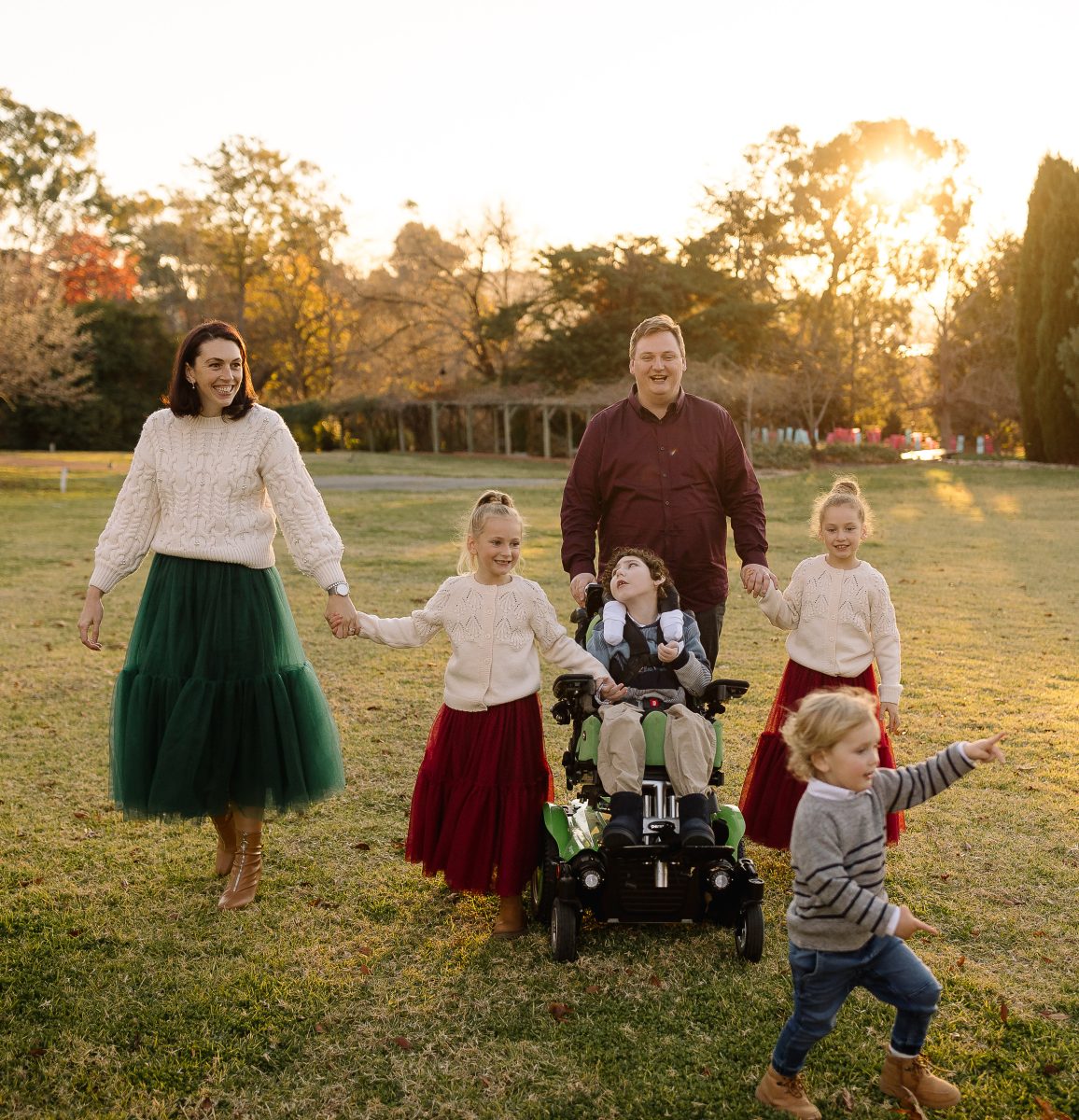A Dad’s Perspective

How do you define happiness? When did you know you were in love? How long is a piece of string? Does a bear eat honey in the woods? Should you buy NRL Grand Final tickets in February?
I could write thousands of words to answer each question, but I’m too busy having fun on the rollercoaster that is life, so I’ll answer them all with one word.
Depends.
My eldest son has three younger siblings. He has his own bedroom, gets driven to school daily, doesn’t complain and has never said a swear word. Unlike me, he’s never had detention at school, never asked for money for the canteen, let alone stolen coins from my wallet on the kitchen bench. He is ten years old, loves the Newcastle Knights, cuddles with his Grandparents and Aunties, movie afternoons on the couch, swimming in a pool and giggles at the sound of any good fart.
He also doesn’t talk, can’t walk, hasn’t had any food in his mouth for 7 years, is legally blind, completely deaf in one ear, has a bent spine and an unexplainable imbalance of white and grey brain matter to the point where doctors have labelled him ‘miraculous’. He spends every day in a wheelchair, a lounge recliner or a hospital-grade bed. He is on twelve different medications, and my wife and I administer them through a hole in his belly directly into his stomach every 6 hours, 24 hours a day. He has no concept of how it feels to hold his arm out a car window, take a dog for a walk, fall off a pushbike and graze his knee, get dirt in between his toes, roll his ankle playing cricket with mates, contribute to a team, invite people to his own party or communicate on anything other than a very basic level with any human being who comes across him. Yet he can convey the love and happiness in his heart better than most.
The more I think about parenting, the simpler it appears to be. My wife and I believe that we are on this earth to leave it in a better manner than it was when we arrived, so we have adapted that into our parenting style. We try to teach our children that message, providing tangible, short-term examples every day, all the while attempting to expand it into a broader philosophical message of positivity and productivity. Where we see fit, we provide them with resources and tools to allow their creative intuition to contribute to society in a way that will far outlast their own presence in the community. Simplified for a Dad like me, those 107 words mean that “We are trying to raise good people”.
The brief is “Write something from your personal perspective raising a child with a disability.”
Perspective is a funny thing. Ask an eskimo what the weather is like while he’s on holiday in India. Ask a Saudi Arabian what he thinks of a Tasmanian winter.
I was lucky to have a supportive family, close friends and a multitude of hobbies before I met my wife-to-be at 20 years old. We fell in love quickly, then got pregnant quicker and were not married until our eldest was 2. From some people’s perspective, we got it the wrong way around. From our perspective, we got it right.
At 31 weeks, we were offered termination of our unborn baby due to him being “not compatible with life”. We were told that if he was born alive, we would be lucky to get 10 minutes with him before he slipped away. From our perspective, we were willing to give him every chance we could. We had supportive parents ourselves, without whom, both financially and emotionally, we would not have been able to make the same decision. Christopher was born six weeks later, breathing on his own. We were told by the doctors a month later that we could take him home from intensive care and “just love him” as he is unlikely to live very long at all. We celebrated his tenth birthday earlier this year and have just “kept loving him”.
I am fortunate enough to have a friendship group which promotes a more than healthy level of openness and honesty. We share our thoughts, struggles, triumphs and doubts together in an online chat. As you can imagine, the vast majority of conversation is dribble and meaningless, at times highly inappropriate but always supportive (except if Collingwood are playing). Each of us offers vastly different perspectives and life experiences, and we are proud to tell you just how different we all are. Some of us are unemployed, most of us are underpaid, all of us are hard working and all of us appreciate what we all bring to each other’s lives. There are people who complain about their children being difficult, there are people who don’t want kids, there are people who are trying for kids, can’t have kids or are just kids themselves…… Ask each of them what life would be like in anyone else’s shoes, and they would give you the same answer I gave earlier.
Depends.
Ask a father who has just walked his daughter down the aisle or watched his son receive an award for outstanding academic achievement what it would be like to push a wheelchair around the mall, with strangers either judging you or shielding their children to avoid a difficult conversation. They would tell you it was hard. Ask someone who has spent tens of thousands on IVF if they’d like a child who never says no to a cuddle on the couch, even if they can’t say ‘I’m hungry’. They’d probably jump at the opportunity.
Perspective is closely related to traits like humility, understanding and acceptance. And yet, it is so rarely mentioned in the same sentence of desirable qualities.
If you’d asked me what being Christopher’s Dad was like at 31 weeks, I’d have told you it was pretty garbage. For everything outlined above and countless other reasons, most days I reply with “Always Good”.
From my perspective, how could it not be?
Depends.

Tom
Tom and his wife Pam live in the ACT with their four children – Christopher, Charlotte, Matilda and Maxwell. A passionate sport enthusiast, and loyal family man, he prides himself on his recall of random facts and incredible dad jokes. Becoming a father at 20years of age (his eldest born with cCMV) alongside learning to navigate the disability landscape has shaped his unique and powerful perspective; one that affords him compassion, understanding and wisdom beyond his years.